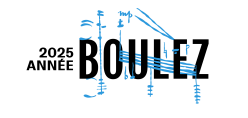Colloquium organized for the centenary of Pierre Boulez's birth by Pr Pierre-Michel Menger, Sociology of Creative Work Chair, and Nicolas Donin, Professor of Musicology at the University of Geneva.
With the support of the Collège de France Foundation and its major sponsor LVMH.
The colloquium will be enhanced by two concerts given by the Ensemble intercontemporain, partner of the event:
- A workshop-concert onMay22 at 6:30 p.m., following on from the various presentations on the first day of the symposium, and bringing it to a close.
- A concert onMay23 at 8pm, by invitation or prior registration. Registration is compulsory attendance on the 23rd does not guarantee a place.
Presentation
Pierre Boulez's lectures at the Collège de France from 1977 onwards, in a chair entitled " Invention, technique and language in music ", accompanied a period of intense creative and institutional activity. As a composer, Boulez confronted electronics and thematism(Répons, Dialogue de l'ombre double) and revisited in depth works from his first period(Notations, Le Visage nuptial). Boulez, conductor, applies his exacting interpretive standards to both twentieth-century classics and to a new generation of composers, whom he promotes in concert and on disc. Boulez is a founder of institutions, directing the Ensemble intercontemporain (EIC) and the Institut de recherche et de coordination acoustique/musique (Ircam), as well as being involved in the major musical projects of French cultural policy (Opéra Bastille, Cité de la musique). Following his retirement as director of Ircam in 1992 and of the Collège de France in 1995, Boulez embarked on a new phase in his career, focusing primarily on orchestral conducting.
These two decades coincided with a strong public exposure of Boulez's figure, particularly in France, between admiration and contestation. However, research has yet to come to grips with the complex dynamics of his multifaceted work, as it did with the Boulez of the 1950s and 1960s. The young musician who criticized institutions became the founder of an institution. What intellectual, aesthetic and logistical organization enabled Boulez to explore such varied issues, repertoires and modes of action in parallel ? What role does musical invention now play in his multiple roles ? What sources and reading keys could shed new light on the positions formulated in Boulez's many sayings and writings of this period ?
2025 Année Boulez is supported by the French Ministry of Culture in collaboration with the Philharmonie de Paris.



